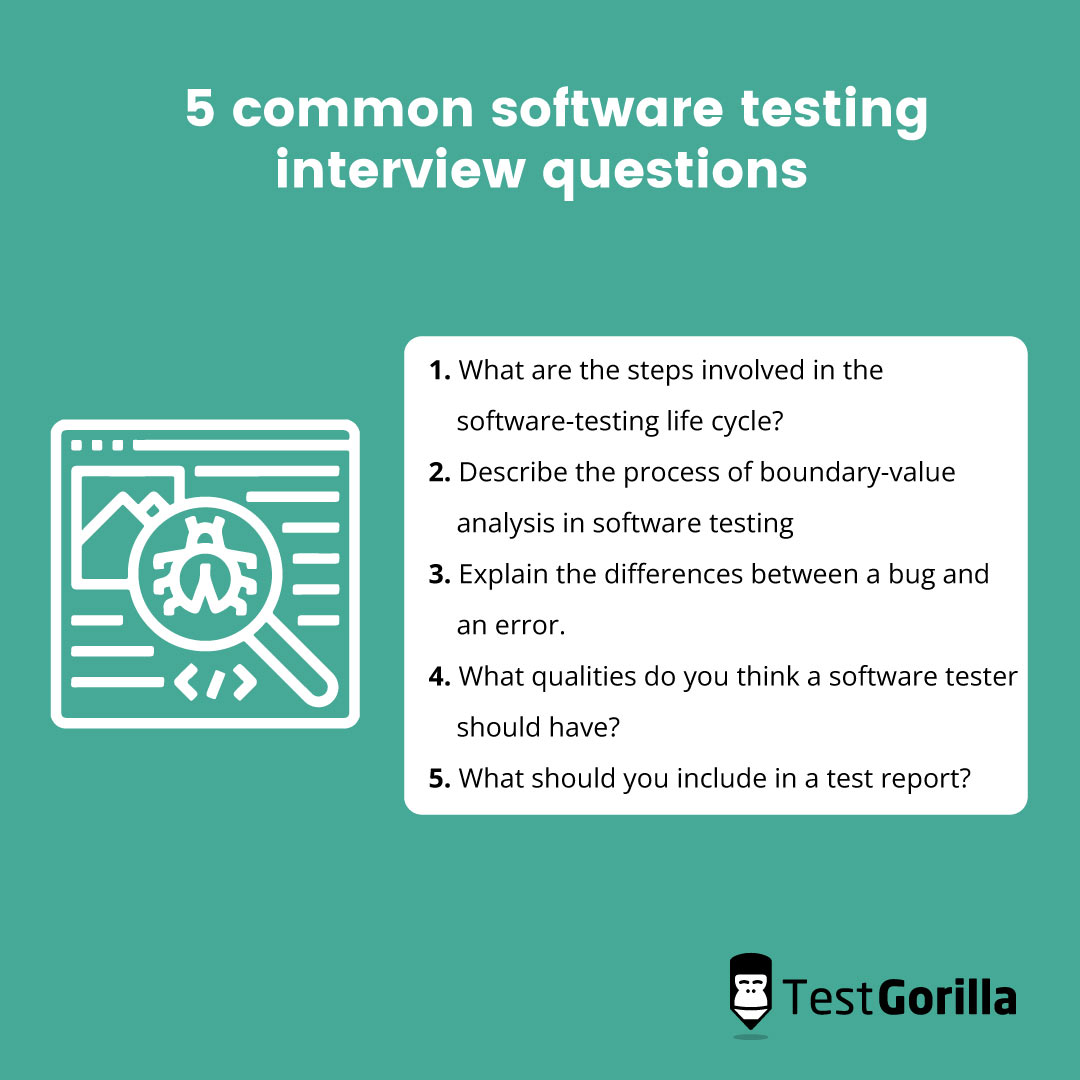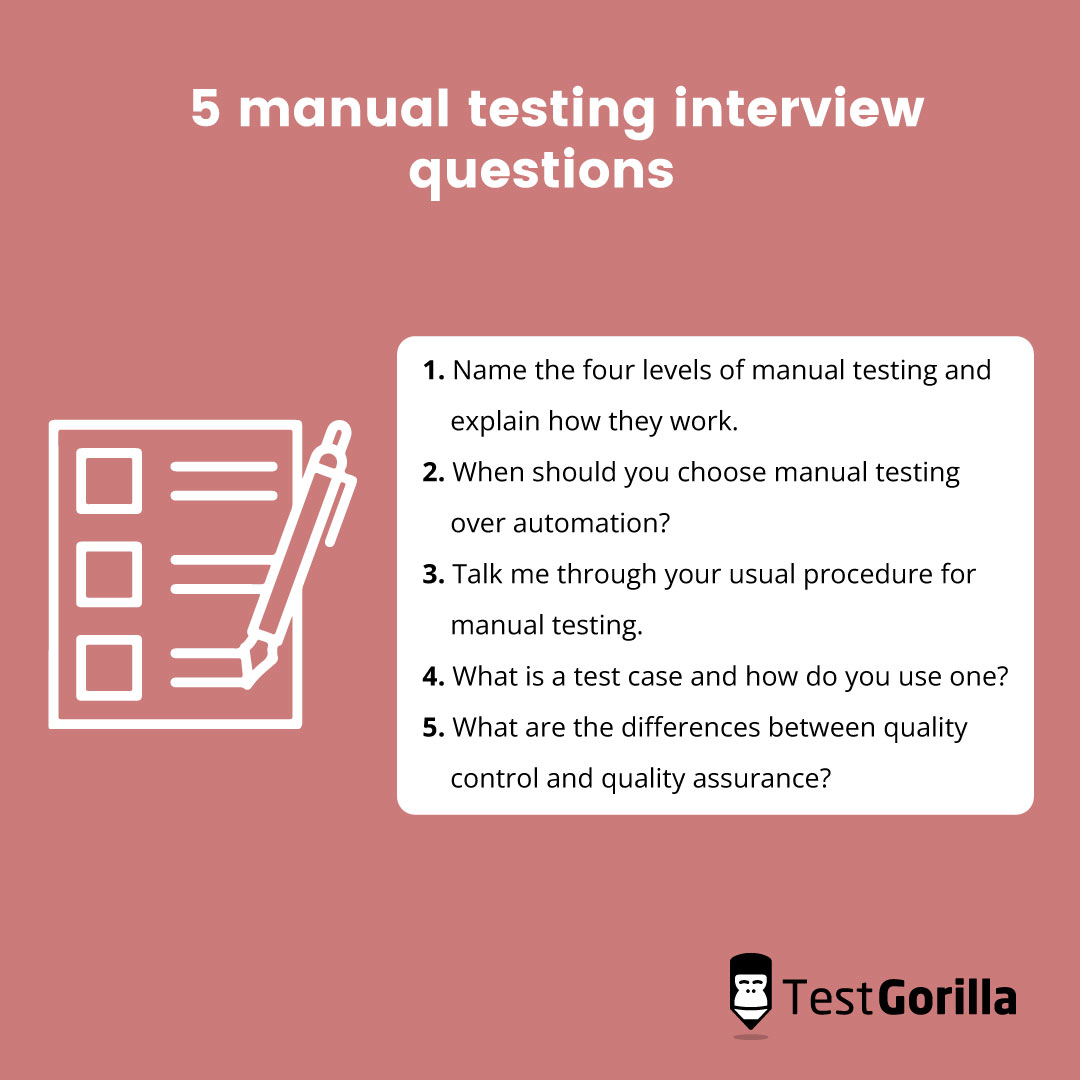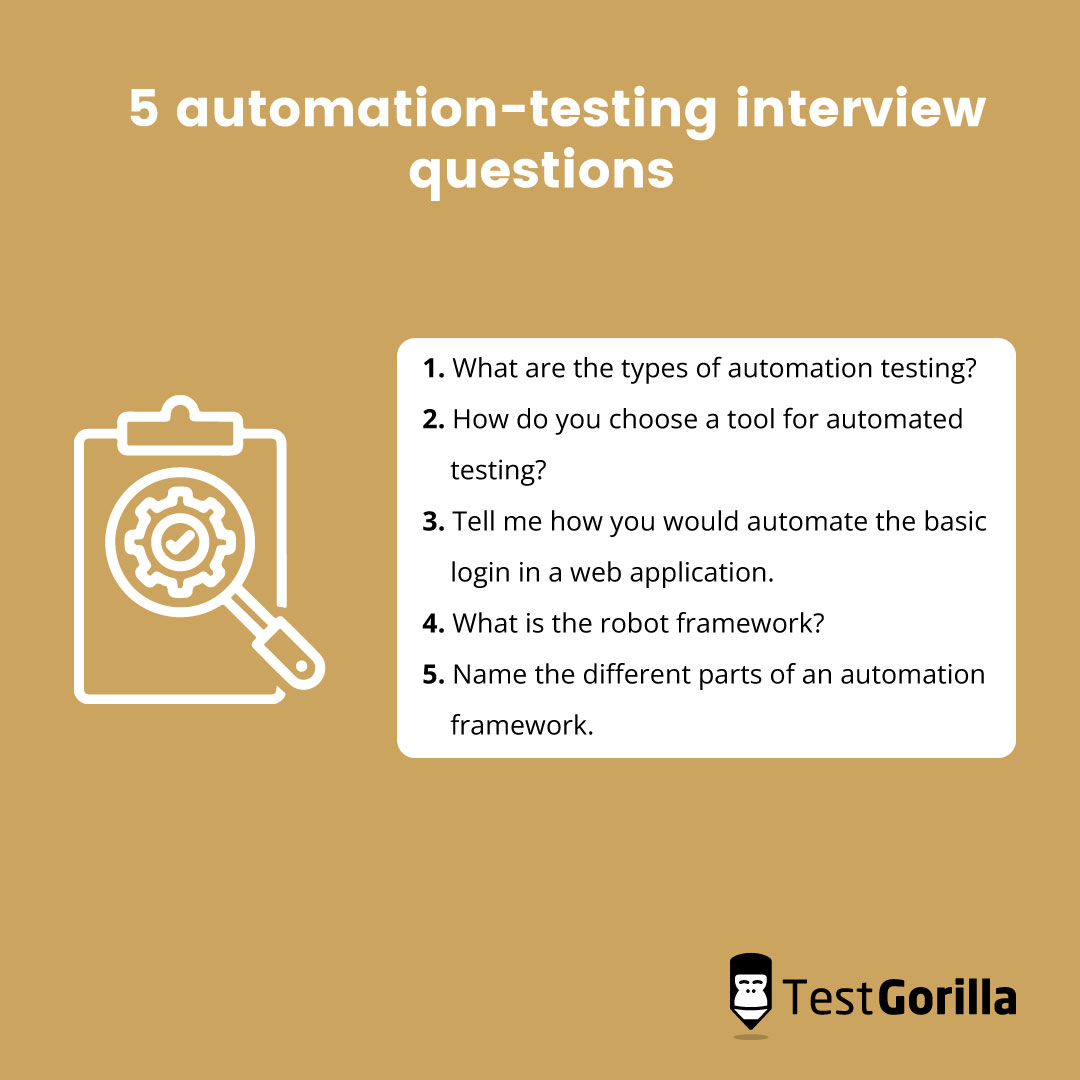50 testing interview questions for skilled developers and programmers
The software industry is constantly growing and evolving to suit technological advancements. So, anyone looking to work in this field should have the right skills and knowledge to perform extensive software testing.
Are you looking for a talented computer professional? To hire the most skilled web developers or programmers, we advise you to:
Use a skills assessment to screen candidates and determine who has the right skills and experience for the testing role; you can combine up to five tests in a single assessment, such as our Software Engineer test, Android Development Using Java test, GitHub test, Object-Oriented Programming test, and more
Arrange interviews for shortlisted candidates to better understand their personality and expertise
If you don’t yet know what questions to ask during the interview, this article is for you. To help you streamline your hiring process, we’ve prepared a list of 50 testing interview questions related to all the different types of software testing.
Table of contents
- 20 common software testing interview questions to ask developers
- 5 common software testing interview questions and sample answers
- 15 manual testing interview questions for experienced testers
- 5 manual testing interview questions and sample answers
- 15 automation-testing interview questions to ask test engineers and product developers
- 5 automation-testing interview questions and sample answers
- When should you use testing interview questions in your hiring process?
- Hire talented computer professionals using our testing interview questions and skill assessments
20 common software testing interview questions to ask developers
Check out these 20 software testing interview questions to help you better understand candidates’ knowledge of software development.
1. What are the steps involved in the software-testing life cycle?
2. Explain the three different methods of testing.
3. What are verification and validation?
4. What are regression and confirmation testing?
5. Describe the process of boundary-value analysis in software testing.
6. Explain the basic components of the defect-report format.
7. What is meant by the workbench concept?
8. Name a few principles of software testing.
9. What is an API?
10. Talk me through the steps of using a test coverage tool.
11. What is a bug in software testing?
12. Explain the differences between a bug and an error.
13. What should you include in a test report?
14. Can you name some common mistakes in software testing?
15. What are latent defects and masked defects?
16. What is the purpose of TestNG?
17. What qualities do you think a software tester should have?
18. Define what SDLC means in software testing.
19. Name some essential testing metrics.
20. What is Selenium? Can you name some of its benefits?
5 common software testing interview questions and sample answers
Below, you’ll find our selection of the five most important questions from the previous section, along with sample answers. Use them when evaluating candidates’ responses during and after the interviews.
1. What are the steps involved in the software-testing life cycle?
Candidates should know the different phases of software testing. This question determines how much knowledge and experience they have in software development. They should be able to explain each step:
Plan strategies: The software professional defines a test strategy to implement into the coding system.
Test-case development: A software developer or programmer develops the strategy further to meet framework and coding requirements.
Environment design: Testing teams set up the software and hardware to conduct test cases.
Execution: This is the automation or manual testing process where software developers execute the code and compare results.
Test-cycle end: All teams meet to discuss the results and evaluate the test coverage, cost, quality, and production time.
You can better understand the candidate’s programming skills by sending them an Algorithms for Software Engineering test.
This test identifies talented computer professionals who can use different types of algorithms and algorithmic approaches, such as advanced graph algorithms, growth functions, sorting algorithms, and more.
2. Describe the process of boundary-value analysis in software testing
Recruiters ask this common question to identify talented programmers or developers, because it tests their knowledge of advanced test cases.
Candidates should explain that boundary-value analysis (BVA) is a black-box testing method. Software developers use this technique to identify bugs in the input domain and test specific program behaviors.
Beyond 2023, experts expect the software testing industry to grow at a compound annual growth rate (CAGR) of 16.4%. This growth means an increased demand for specialists in the field, so it’s essential to hire a professional who understands testing terms like BVA. If they don’t, it’s a sign they may not be a suitable fit.
3. Explain the differences between a bug and an error.
The ideal candidate will be able to clearly define bugs and errors in software testing. Even beginners should know that these instances are very different when it comes to test cases. They might state the differences below:
Bugs | Errors |
Bugs are defects that occur when there is a coding fault; A software bug can cause the program to malfunction; Testing teams usually submit the bug to ensure it doesn’t happen again; There are logic, resource, and algorithmic bugs; Software programs can detect bugs before deployment | Poor coding design can cause errors; The software developer may have defined the code incorrectly or missed a mistake in the requirements; Syntactic, error handling, user interface, flow control, testing, and calculation errors are types of common errors; Errors occur when the system cannot compile the inputted code |
You can send candidates a Problem-Solving test to see whether they have the right cognitive skills to analyze and solve problems efficiently.
4. What qualities do you think a software tester should have?
A talented software tester should have various skills that help them test code and web applications. For example, they might need strong attention-to-detail skills to identify bugs or implement complex code, or basic programming skills to navigate computer systems and software deployment.
Use an Attention to Detail test to determine whether candidates are able to check the code’s consistency and accuracy efficiently.
5. What should you include in a test report?
Candidates should know that a test report includes the application’s main objectives, actions, and test results. This report can help programmers and developers decide whether the program is ready for launch. Test reports must include:
Test objectives
Project details and key information
Defects
Overall summary
The best insights on HR and recruitment, delivered to your inbox.
Biweekly updates. No spam. Unsubscribe any time.
15 manual testing interview questions for experienced testers
Below are 15 manual testing interview questions to help you hire the right computer professionals for your company.
1. What are the differences between quality control and quality assurance?
2. Name the four levels of manual testing and explain how they work.
3. What is a testbed?
4. Give me some benefits of manual testing.
5. When should you choose manual testing over automation?
6. Explain the difference between positive and negative testing.
7. What are the disadvantages of manual testing?
8. What is the pesticide paradox? How do you overcome it?
9. What would you do if your software has too many bugs?
10. Define configuration management.
11. What is a test case and how do you use one?
12. Name the types of manual testing.
13. When should you end the manual test?
14. Talk me through your usual procedure for manual testing.
15. What is integration testing? Can you name some of its types?
5 manual testing interview questions and sample answers
Review the five most important manual testing interview questions and sample answers below when narrowing down your list of candidates.
1. Name the four levels of manual testing and explain how they work.
A few levels are involved in manual testing, which candidates should be aware of. The ideal candidate may name each level and explain how it benefits manual testers or improves test cases. In the interviews, listen for responses that focus on the following:
Unit testing: Software developers test the smallest piece of code that makes up a unit in the system.
Integration testing: This level combines single units to verify their effectiveness when integrated with another interface.
System testing: Each testing team measures every software component to ensure it meets product requirements.
User acceptance testing: A software developer can consider whether the company should release the software, depending on any reported bugs or potential risks that derive from coding.
2. When should you choose manual testing over automation?
Research suggests that manual testing accounts for 30% of the total project effort.
Even though automation testing is a new process, programmers can still use manual tools to build short-time applications or conduct usability testing.
Candidates may also suggest exploratory methods and explain how they contribute to the efficiency of testing. For example, sometimes the software developer will simply use their intuition and logical thinking to check a program without any plans or scripts.
3. Talk me through your usual procedure for manual testing.
Everyone has a unique procedure when conducting a manual test. You should evaluate the candidate’s ability to express their thought process and talk you through the steps they take when doing manual testing.
The ideal candidate will cover steps such as:
Software management
Analysis and code design
Implementation and test execution
Software evaluation and reporting
Test closure
Use a Critical Thinking test to better understand the candidate’s analytical skills. They should be able to analyze important information and create their own procedures based on their manual-testing experience and programming skills.
4. What is a test case and how do you use one?
A test case is a document that holds required actions and specific conditions. Software developers can use this information to test the functionality of a program before they release it.
Testing teams usually give developers an idea of what to test, rather than outlining specific steps or framework tools. For example, they might test whether discounts work on the checkout summary page.
5. What are the differences between quality control and quality assurance?
Candidates should know that quality control and quality assurance are not the same.
Quality control is a product-focused method that enables software testers to test the program for any bugs or errors. They can also determine whether the final product meets client or customer requirements.
On the other hand, developers use quality assurance for the testing process. This approach covers software developers’ methods, techniques, and tools to design high-quality products.
Consider using a QA skills test to see how candidates identify problems and whether they’re able to improve the final quality of a product.
15 automation-testing interview questions to ask test engineers and product developers
Below are 15 automation testing interview questions to help you hire candidates with top programming skills and knowledge of automation.
1. When should you choose automated testing over manual testing?
2. What are the types of automation testing?
3. How do you choose the right tool for automated testing?
4. Name the different parts of an automation framework.
5. What is a test environment?
6. What is cross-browser testing?
7. Explain some of the best practices in automation testing.
8. What is the robot framework?
9. Tell me how you would automate the basic login in a web application.
10. What are the risks of automated testing?
11. What are the important components of an automation-testing framework?
12. Give some examples of automation-testing tools.
13. Is automation black-box testing or white-box testing?
14. What is an automated test script?
15. What is the hybrid testing framework?
5 automation-testing interview questions and sample answers
The sample answers to the five most important automation-testing interview questions will help you evaluate applicants’ responses and choose the most suitable person for the open position.
1. What are the types of automation testing?
The ideal candidate will know about the testing techniques that are prone to automation. With 33% of companies wanting to do more automated testing this year, candidates must have the necessary knowledge to navigate automated software-testing strategies.
They could mention a few different types of automation testing, such as:
Unit testing: Software developers usually write this type of code to test individual units and reduce wasted time during product development.
Performance testing: This test ensures the software or web application doesn’t crash or lag under heavy code.
Integration testing: Integration testing enables computer professionals to evaluate how different software modules work with each other and respond to specific actions.
Regression testing: Testing teams need to ensure that new pieces of code don’t break existing features.
User-interface testing: UI tests help provide a consistent and positive user experience by monitoring visual and design elements on the screen.
2. How do you choose a tool for automated testing?
Software developers and programmers have to rely on different tools and frameworks. They must choose the right tools based on their programming skills, commercial or open-source features, and ease of use.
It’s also essential that all team members agree with the tool and feel comfortable using it.
3. Tell me how you would automate the basic login in a web application.
There are a few ways a software developer can automate a basic login. The candidate should provide some key steps to navigating this process in a web application, such as to:
Test the input fields, checkboxes, and buttons on the login page
Prepare a test script that focuses on usernames and passwords
Develop test cases to evaluate several paths a user may try when using their login information
Configure the test case to record instances where the output doesn’t align with the expected actions
Identify errors and ensure the page prompts another login attempt
Top programmers will most likely have experience with this type of automation process.
4. What is the robot framework?
The robot framework is an open-source automation strategy software developers use for robotic process automation (RPA).
This framework can detect and understand some forms of press keys, buttons, and navigation to external links on the screen. Candidates should know that Python uses RPA to test data and keywords in a software library.
Send candidates a Python test to understand their basic programming skills and evaluate how they approach RPA.
5. Name the different parts of an automation framework.
Experienced candidates should be able to explain the most essential parts of an automation framework. Their answer will determine whether they understand automation and how it works for web applications. For a bonus point, candidates should mention:
Library testing and management: Automation libraries focus on computer and networking technologies. Software developers can use library automation to increase resources and material sharing.
Automation tools: QA testers need command-line and graphical user interface (GUI) tools to run tests efficiently.
Data management and design: The framework can help build test data to import data models and generate relevant test cases for easy and quick automation.
When should you use testing interview questions in your hiring process?
We recommend using the testing interview questions from this article after having administered skill tests. This process can help you identify talented programmers and developers who can navigate any testing framework.
Skill assessments are one of the best tools for identifying top candidates. You can send up to five tests to each candidate to better understand their skills, work experience, and personality.
For example, you may use a Clean Code test to evaluate the candidate’s ability to write and maintain clean code in a technical environment. If you want to understand their expectations and values, personality assessments such as the Culture Add test could prove beneficial.
Comparing results enables you to quickly narrow down your list of candidates and invite only the most skilled ones to an interview. This way, you’ll be able to hire talented professionals with extensive knowledge of several testing processes and programming frameworks.
Hire talented computer professionals using our testing interview questions and skill assessments
You now have a selection of 50 testing interview questions, but what about skill tests?
Head on to our comprehensive test library to find the most relevant skills tests and build your first assessment. With our tests, you can evaluate anything, from personality traits and motivation to programming skills.
Each candidate has the same amount of time to complete the questions and prove their knowledge and skills, making tests an objective and accurate assessment tool.
Our free 30-minute live demo can also give you insight into the skill-testing process and help you figure out exactly which tests to choose when screening job applicants.
Once you have prepared your skills assessment and have a list of the right testing interview questions, you can start your recruitment process. Join the 9000+ companies who have replaced resumes with skills testing and hire the right candidate quickly and efficiently.
You've scrolled this far
Why not try TestGorilla for free, and see what happens when you put skills first.

















